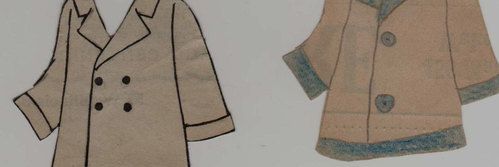The Emperor\'s New Clothing

"Jesus gives us clothes of salvation and righteousness that we can't earn, can't buy, and can't find here on the earth."
When I was a kid, I had a children's book that told the story of The Emperor's New Clothes. If you're not familiar, there is an emperor who loves wearing fine and expensive clothes. Soon, he hires two con men who tell him that they will make him the finest suit in the world—so fine that it is invisible to anyone who is not intelligent and sophisticated. Even though no one (including the emperor) can see the fabric, the entire court is too embarrassed to admit it, so they all ooh and aah at how fine the clothing will be. In the grand finale, the emperor goes out on parade before the city in his "new clothes," with the entire city oohing and aahing at clothes they can't see. A little child, too young to care that he is important enough to see the frabric, shouts out that the emperor has no clothes! The emperor hears the child, and, though he fears the child might be right, continues parading naked through the streets.
There's a reason the story has stuck around for so long (it was originally published in 1837). We all work hard to be thought of as respectable, intelligent, worthwhile, and included in whichever crowd we consider "in." A lot of us make it, or at least get close. We get good at our job, or good at our hobbies, or good at telling jokes, or good at knowing lots of things, and we put on those clothes and wear them around for everyone to see. We feel good about ourselves when someone shows up with worse clothes on (we are better at our jobs, for example), and we get intimidated when someone shows up with nicer clothes (they are the CEO). And yet each person walking in the parade is wondering, are these clothes even real?
But what can we do? The whole world wants to see the clothes. And we want them to be real. We want them to last, to prove something to ourselves and to everyone else. So we tend to silence the doubts, keep our heads down, and work for that next set of clothes that we can wear in the parade.
The Bible is a strong voice. Stronger than a small child at a parade. But it calls out the same message: the emperor has no clothes! Upper management, "perfect families," and 4.0 GPA students are all walking in the parade naked, but only the Bible comes in and calls it like it is. Which is a devastating message for each of us. What do you spend your day doing? How much of your life falls apart if the clothes aren't actually real, and you've just been too proud to admit it? A lot of our daily conversations, driving habits, dreams, frustrations, and goals revolve around getting and keeping clothes that aren't real.
God might expose that we have no clothes on, but he doesn't leave us that way. The Bible forces us to deal with the fact that our clothes aren't real, but then it explains that real clothes exist out there. And God will give the to us freely. In Isaiah 61:10, it says:
Jesus gives us clothes of salvation and righteousness that we can't earn, can't buy, and can't find here on the earth. Today you will want to walk in the parade, and find the best fake clothes to wear. Don't give in to the temptation. Instead, put on the clothes Jesus has given you. They're real, so they keep you warm and they fit better. The world won't put you in any parades, but, then again, you won't be naked. Most of all, you'll be dressed like royalty in the eyes of God, who gave his Son to make you approved in his sight. One day the parade on earth will be over and we'll be standing in front of Him. On that day, everyone will realize the other clothes aren't real. Only his garments will last forever.
When I was a kid, I had a children's book that told the story of The Emperor's New Clothes. If you're not familiar, there is an emperor who loves wearing fine and expensive clothes. Soon, he hires two con men who tell him that they will make him the finest suit in the world—so fine that it is invisible to anyone who is not intelligent and sophisticated. Even though no one (including the emperor) can see the fabric, the entire court is too embarrassed to admit it, so they all ooh and aah at how fine the clothing will be. In the grand finale, the emperor goes out on parade before the city in his "new clothes," with the entire city oohing and aahing at clothes they can't see. A little child, too young to care that he is important enough to see the frabric, shouts out that the emperor has no clothes! The emperor hears the child, and, though he fears the child might be right, continues parading naked through the streets.
There's a reason the story has stuck around for so long (it was originally published in 1837). We all work hard to be thought of as respectable, intelligent, worthwhile, and included in whichever crowd we consider "in." A lot of us make it, or at least get close. We get good at our job, or good at our hobbies, or good at telling jokes, or good at knowing lots of things, and we put on those clothes and wear them around for everyone to see. We feel good about ourselves when someone shows up with worse clothes on (we are better at our jobs, for example), and we get intimidated when someone shows up with nicer clothes (they are the CEO). And yet each person walking in the parade is wondering, are these clothes even real?
But what can we do? The whole world wants to see the clothes. And we want them to be real. We want them to last, to prove something to ourselves and to everyone else. So we tend to silence the doubts, keep our heads down, and work for that next set of clothes that we can wear in the parade.
The Bible is a strong voice. Stronger than a small child at a parade. But it calls out the same message: the emperor has no clothes! Upper management, "perfect families," and 4.0 GPA students are all walking in the parade naked, but only the Bible comes in and calls it like it is. Which is a devastating message for each of us. What do you spend your day doing? How much of your life falls apart if the clothes aren't actually real, and you've just been too proud to admit it? A lot of our daily conversations, driving habits, dreams, frustrations, and goals revolve around getting and keeping clothes that aren't real.
God might expose that we have no clothes on, but he doesn't leave us that way. The Bible forces us to deal with the fact that our clothes aren't real, but then it explains that real clothes exist out there. And God will give the to us freely. In Isaiah 61:10, it says:
"I will greatly rejoice in the Lord; my soul shall exult in my God, for he has clothed me with the garments of salvation; he has covered me with the robe of righteousness..."

Posted in Bible and Theology, Calling and Culture, Gospel Motivation, Heart Work and Change
Posted in Brian Colmery
Posted in Brian Colmery
